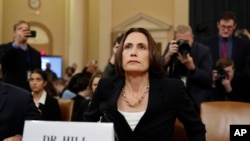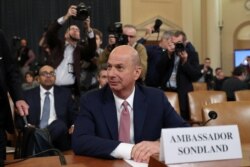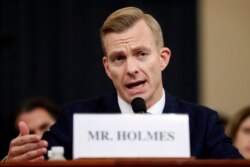A former key official on the White House National Security Council told the impeachment inquiry targeting President Donald Trump on Thursday that it is a "fictional narrative" that Ukraine, and not Russia, meddled in the 2016 U.S. election that Trump won.
Fiona Hill, in testimony before the House Intelligence Committee, directly contradicted Trump, who only occasionally has said it was possible Russia intervened in the election, while saying he accepts Russian President Vladimir Putin's denial that Moscow interfered to support him.
In a July 25 call that is central to the impeachment inquiry, Trump asked Ukrainian President Volodymyr Zelenskiy "to do us a favor," to investigate one of his chief 2020 Democratic rivals, former Vice President Joe Biden, and the debunked theory that Ukraine worked in 2016 to help Trump's Democratic challenger, former U.S. Secretary of State Hillary Clinton.
Hill described the efforts by Trump administration officials to get Ukraine to launch the investigations as a "domestic political errand," diverging from U.S. foreign policy goals.
Hill, who until earlier this year was the security council's top Russia adviser, said, "Based on questions and statements I have heard, some of you on this committee appear to believe that Russia and its security services did not conduct a campaign against our country—and that perhaps, somehow, for some reason, Ukraine did. This is a fictional narrative that has been perpetrated and propagated by the Russian security services themselves."
She said, "The unfortunate truth is that Russia was the foreign power that systematically attacked our democratic institutions in 2016. This is the public conclusion of our intelligence agencies, confirmed in bipartisan congressional reports. It is beyond dispute, even if some of the underlying details must remain classified."
Hill pleaded with the Intelligence panel, "In the course of this investigation, I would ask that you please not promote politically driven falsehoods that so clearly advance Russian interests."
She said claims that Ukraine meddled in the 2016 election "are harmful even if they are deployed for purely domestic political purposes."
"President Putin and the Russian security services operate like a Super PAC," Hill said. "They deploy millions of dollars to weaponize our own political opposition research and false narratives. When we are consumed by partisan rancor, we cannot combat these external forces as they seek to divide us against each another, degrade our institutions, and destroy the faith of the American people in our democracy."
Hill later said "it appears to be" that Trump listened to conjecture about Ukraine trying to undermine his 2016 election from Rudy Giuliani, his personal attorney whom he had named to oversee U.S.-Ukraine relations, sidelining normal Washington-Kyiv connections handled by the State Department.
But Hill emphasized that there was "no basis" for the theory that Ukraine interfered in the election. She also said she was not aware of any evidence supporting allegations of wrongdoing by Biden or connected to his son Hunter Biden's work for a Ukrainian natural gas company.
However, the lead Republican on the Intelligence panel, Congressman Devin Nunes, said that Trump's interest in investigating any Ukraine involvement in the 2016 election was legitimate as a counterpoint that Russia had meddled. Nunes suggested that political research paid for by opposition Democrats denigrating Trump during the campaign three years ago had its origins in Ukraine.
Hill, testifying on the fifth day of the impeachment inquiry, was the second Trump administration official in two days to directly confront Trump's narrative about his dealings with Zelenskiy and thoughts on Ukraine.
Sondland testimony
On Wednesday, Gordon Sondland, the Trump-selected U.S. ambassador to the European Union, told the Intelligence panel that the president and top officials in his administration were at the center of a quid pro quo plan, Trump's efforts to get Ukraine to open the investigation of Biden, his son Hunter Biden's work for a Ukrainian natural gas company and the 2016 election before he would agree to a White House meeting with Zelenskiy. At the same time, Trump was temporarily blocking release of $391 million in U.S. military aid Kyiv wanted to fight pro-Russian separatists.
Trump again denied any reciprocal deal between the military assistance and the investigations on Wednesday. Republicans on the Intelligence panel won acknowledgement from Sondland that Trump had not given him any direct orders linking the investigations to a White House meeting or the release of the military aid. Sondland said he presumed the linkage based on conversations with Giuliani, who was acting at the behest of Trump on Ukraine matters.
In a Twitter comment Thursday ahead of Hill's testimony, Trump complained about the coverage of Sondland's testimony, saying, "The Republican Party, and me, had a GREAT day yesterday with respect to the phony Impeachment Hoax, & yet, when I got home to the White House & checked out the news coverage on much of television, you would have no idea they were reporting on the same event. FAKE & CORRUPT NEWS!"
What Holmes witnessed
David Holmes, a career Foreign Service officer who works in the U.S. Embassy in Kyiv, also testified Thursday, relating a cell phone conversation he overheard July 26 at a Kyiv restaurant when Sondland called Trump, the day after the president's conversation with Zelenskiy.
Holmes said he overheard the Trump-Sondland call because Trump's voice was loud, and Sondland held the phone away from his ear.
Holmes said Sondland in the call assured Trump that Zelenskiy "loves your ass." Sondland testified Wednesday that the comment "sounds like something I would say."
"So, he's gonna do the investigation?" Holmes quoted Trump as asking. Sondland, according to Holmes, replied, "He's gonna do it," while adding that Zelenskiy will do "anything you ask him to do."
Holmes said he later asked Sondland if Trump cared about Ukraine, with Sondland agreeing that Trump did not "give a s**t about Ukraine." Sondland testified he did not recall this remark but did not rebut Holmes's account.
"I asked why not," Holmes recalled, "And Ambassador Sondland stated that the president only cares about big stuff. I noted that there was big stuff going on in Ukraine, like a war with Russia, and Ambassador Sondland replied that he meant big stuff that benefits the president, like the Biden investigation."
In an apparent attempt to undercut Holmes's testimony based on overhearing his conversation with Sondland, Trump tweeted, "I have been watching people making phone calls my entire life. My hearing is, and has been, great. Never have I been watching a person making a call, which was not on speakerphone, and been able to hear or understand a conversation. I’ve even tried, but to no avail. Try it live!"
White House spokeswoman Stephanie Grisham attacked both Hill and Holmes, saying, "As has been the case throughout the Democrats' impeachment sham, today's witnesses rely heavily on their own presumptions, assumptions and opinions. These two witnesses, just like the rest, have no personal or direct knowledge regarding why U.S. aid was temporarily withheld."
She added: "The Democrats are clearly being motivated by a sick hatred for President Trump and their rabid desire to overturn the 2016 election. The American people deserve better."






